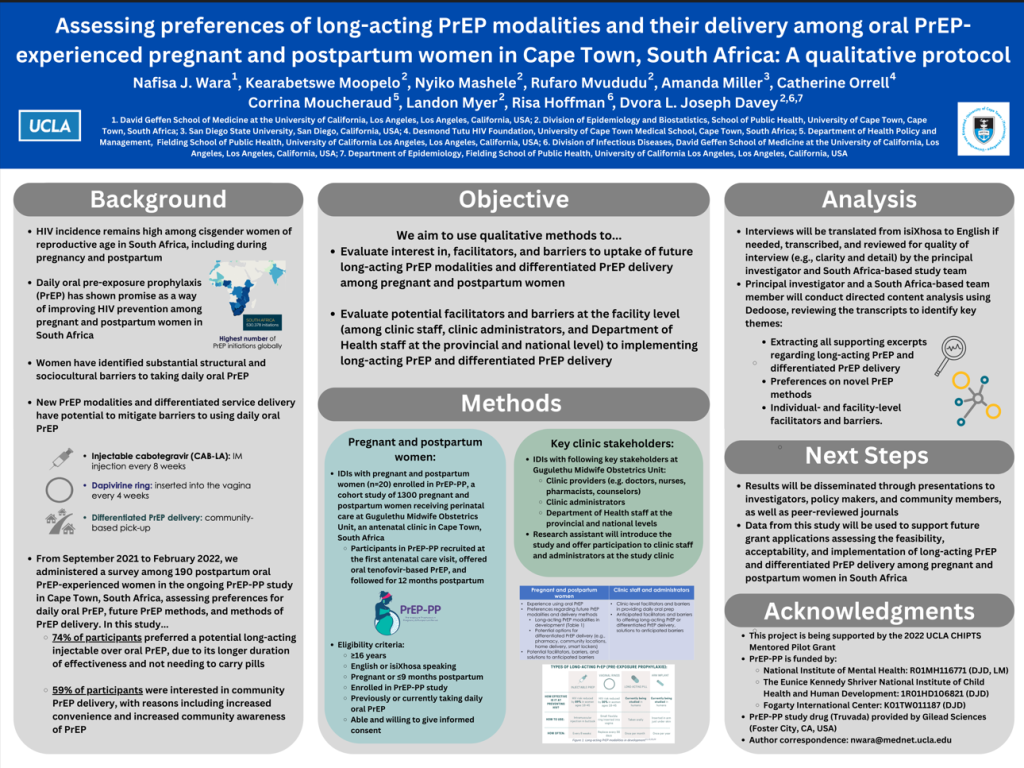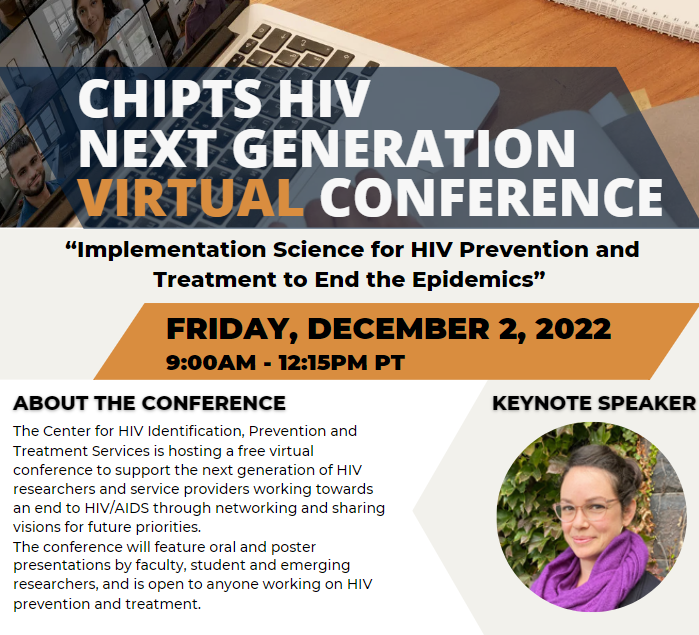The 2022 CHIPTS HIV Next Generation Virtual Conference is this upcoming Friday, December 2, 2022 from 9:00 AM – 12:15 PM PT! The conference is VIRTUAL and FREE to attend.
Please REGISTER if you would like to attend.
The goal of this conference is to support the next generation of HIV researchers, HIV prevention and treatment practitioners, and service providers working towards an end to HIV/AIDS through networking and sharing visions for future priorities. The theme of this year’s conference is “Implementation Science for HIV Prevention and Treatment to End the Epidemics.” The conference will feature oral and poster presentations by faculty, student and emerging researchers from various institutions.
- Conference program: 2022 CHIPTS HIV Next Generation Conference Program
- Download agenda only: 2022 CHIPTS HIV Next Generation Conference - Agenda
- Download presenter guidelines: 2022 CHIPTS HIV Next Generation Virtual Conference - Guidelines
- Download oral presentations: 2022 CHIPTS HIV Next Generation Conference Oral Presentations List
- Download poster presentations: 2022 CHIPTS HIV Next Generation Conference Poster Presentations
- Download: Zoom Breakout Room Instructions
CEU credits: Attend the conference, and sign in and out using the form that will be provided to receive credits. The PAETC will follow up post-conference.
The Pacific AIDS Education and Training Center – Los Angeles Area is accredited to provide the following: Continuing LCSW and MFT Education Credit. Courses meet the qualification for a maximum 3.5 hour of continuing education credit for LMFTs, LCSWs, LPCCs, and LEPs as required by the California Board of Behavioral Sciences. Provider #PCE 128280. Continuing Nursing Education Credit. Course is approved for a maximum of 3.5 contact hour by the California Board of Registered Nursing. Provider #15484.
We invite you to take a look at the poster presentations below which will be featured at the 2022 Next Generation Virtual Conference.
POSTER PRESENTATION 1
Presenter(s):
- Gabriel Edwards, MD, MPH, Associate Project Scientist, Department of General Internal Medicine and Health Services Research, UCLA David Geffen School of Medicine
Presentation Title: Mobile Enhanced Prevention Support: App Design for People Leaving Jail
Summary: This is a project which received funding as part of the CHIPTS 2022 Mentored Pilot Grant Program. It focuses on a population at high risk for HIV -sexual and gender minorities with a recent history of incarceration and substance use, and aims to gather qualitative data on the way the population engages with mobile technology to address health and social needs. We use an implementation science framework centering around health equity to guide data collection.
[Insert Image]
POSTER PRESENTATION 2
Presenter(s):
- Khadesia Howell, MPH, RAND Corporation, Doctoral Student, Pardee RAND Graduate SchooL
Presentation Title: A ‘Think Aloud’ Qualitative Study to Improve Coping with Discrimination and Reduce Health Disparities among Black Sexual Minority Men
Summary: ‘Think Aloud’ is a processes can add depth to the quantitative and qualitative research and gives dimension to thought processes and behavioral responses. There are a variety of studies looking at Black sexual minority men and intersectionality’s impact on mental health and stigma; however, they do not combine ‘Think Aloud’ with self-reported discrimination for a better understanding of the impact of discrimination and stigma on mental health and coping mechanisms.
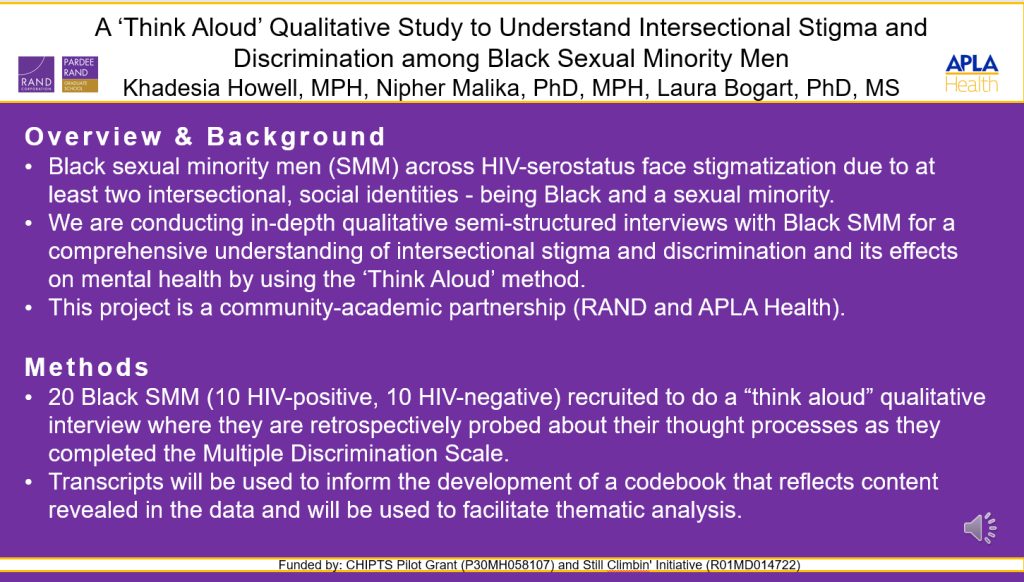
POSTER PRESENTATION 3
Presenter(s):
- Aliaa Ibnidris, PhD, Postdoctoral Research Fellow, Neuroscience Institute, Department of Psychiatry and Mental Health, University of Cape Town
Presentation Title: Association of combined antiretroviral therapy with altered brain function and cognition dysfunction in people with HIV
Summary: Neurocognitive impairment in later stages of HIV is common ad still occurs even in controlled HIV infections with combined antiretroviral therapy (cART). This project aims to look at the association between being on cART with brain function as well as with cognitive performance in people with HIV.
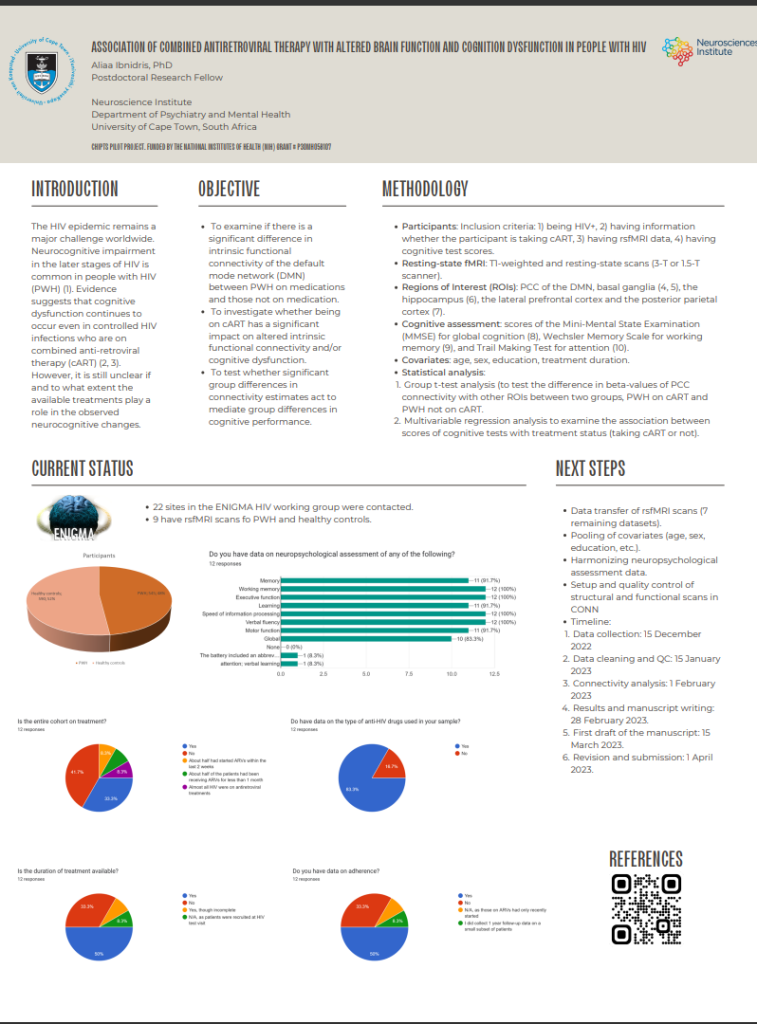
POSTER PRESENTATION 4
Presenter(s):
- Ricardo Mendoza Lepe, PhD, Bilingual Research Coordinator, Bienestar Human Services
Presentation Title: Desde su Persectiva: Inclusivity and Research Community Advisory Boards in Transgender Research
Summary: Meetings to improve research about their communities, learn and be part of their research, learn about research development, and create inclusive and trusted programs for the transgender community.
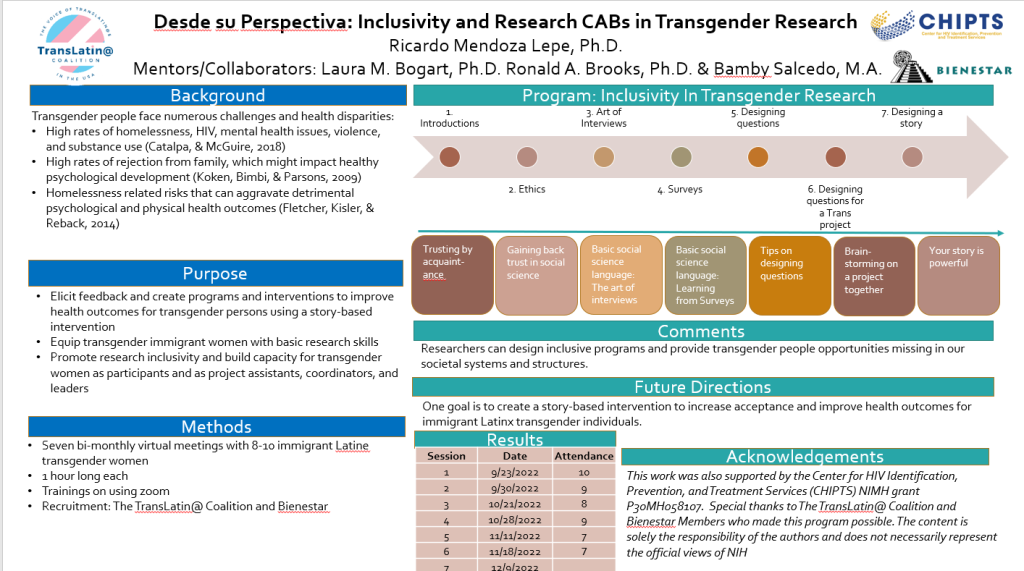
POSTER PRESENTATION 5
Presenter(s):
- Amanda P. Miller, MS, PhD, Postdoctoral Fellow, San Diego State University & University of California San Diego (Joint T32 program)
Presentation Title: Evaluating the relationship between hazardous alcohol use andintimate partner violence and PrEP use in pregnant and breastfeeding women at high risk of HIV in Cape Town, South Africa
Summary: HIV, perinatal alcohol use and intimate partner violence (IPV) represent a syndemic that produces a tremendous public health burden for both mother and fetus in South Africa. Contextualizing drivers of alcohol use and risk factors for IPV among pregnant and breastfeeding women and how alcohol use, IPV victimization and other social determinants of health experienced by South African women influence decision making around PrEP use will provide critical insight into potential points of intervention to address these intersecting health issues. We qualitatively explored these themes among pregnant women at high risk of HIV infection who report using alcohol and/or experiencing intimate partner violence during pregnancy.
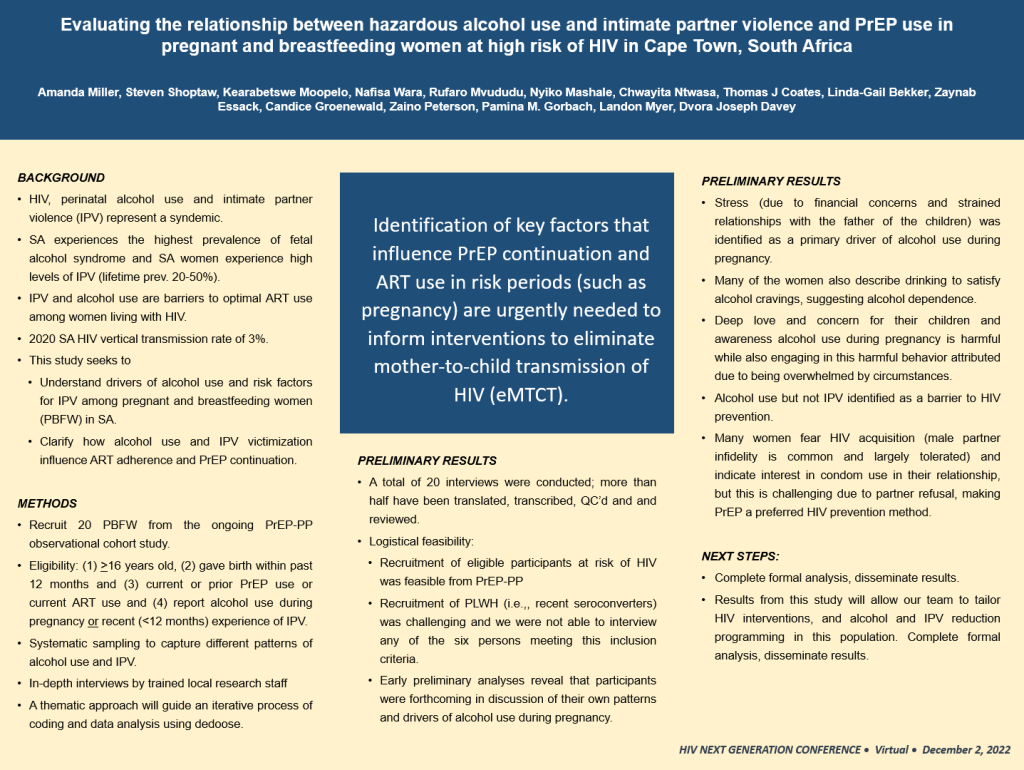
POSTER PRESENTATION 6
Presenter(s):
- Bret Moulton, MPH, Supervising Epidemiologist, Los Angeles County Department of Public Health, Division of HIV and STD Programs
Presentation Title: “Ending the HIV Epidemic” in Los Angeles County: HIV Diagnoses Among Clients Utilizing Free, Mailed HIV Self-Test Kits
Summary: As an emerging strategy to expand HIV testing availability, self-testing can expand screening access to persons who might experience barriers to accessing health care. Since 2020, Los Angeles County has provided free HIV self-test kits through the mail to targeted residents. One-third of people who ordered a kit reported never testing for HIV before, and 1.1% of participants had an HIV diagnosis within one year
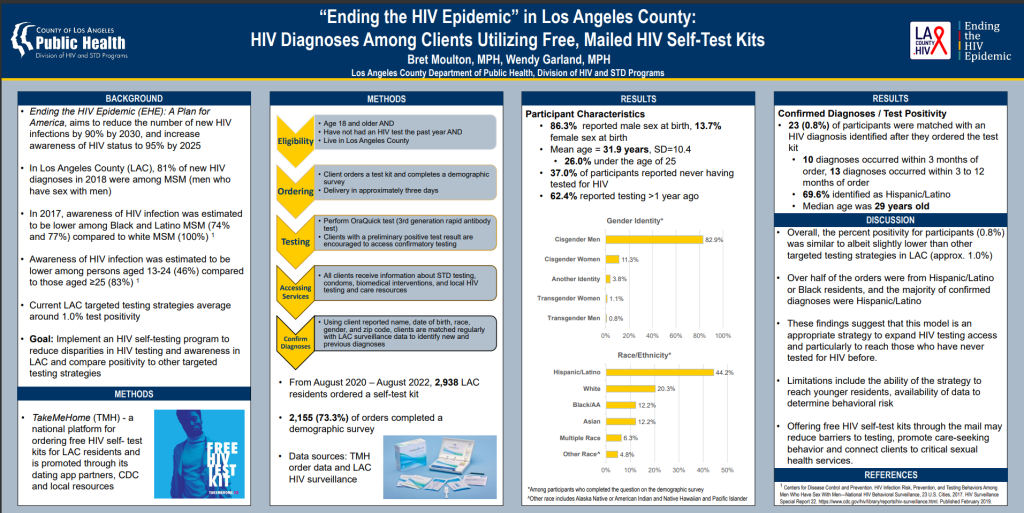
POSTER PRESENTATION 7
Presenter(s):
- Jada Williams, BS, Graduate Student, UCLA Division of Population Behavioral Health
Presentation Title: Experiences of the COVID-19 Pandemic Among Queer Black Men in Los Angeles: Reflections from a Virtual Listening Session
Summary: The CFAR Health Disparities Core convened a virtual listening session with queer Black men living in Los Angeles to describe the meanings of a shared lived experience, as well as the situations, conditions, and contexts that are part of the lived experience of participants. The current study was designed to better understand the experiences of queer Black men, including experiences associated with their sexual minority and race or racialized identities during the COVID-19 pandemic.
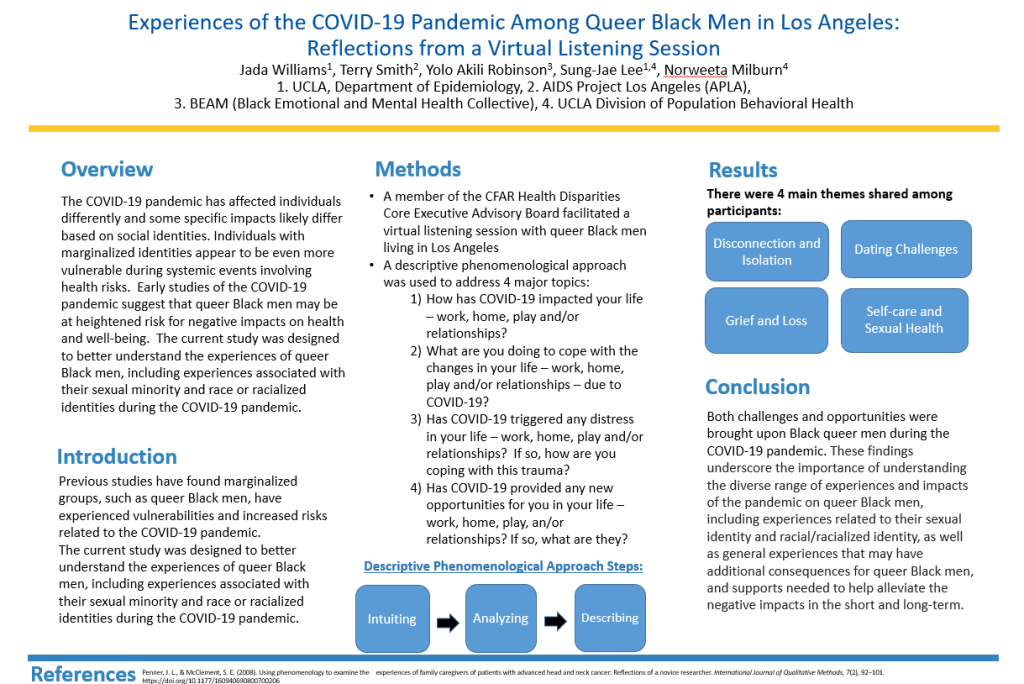
POSTER PRESENTATION 8
Presenter(s):
- Jocelyn Limas, BSc, Graduate Student Researcher, UCLA Fielding School of Public Health – Epidemiology, UCLA Semel Institute Center for Community Health
Presentation Title: Barriers to PrEP initiation among at-risk youth in Los Angeles and New Orleans
Summary: HIV PrEP uptake among adolescents and young adults remains low, prompting research and interventions to address barriers to PrEP initiation with a focus on expanding PrEP awareness and knowledge. In this analysis, data from a study of the Adolescents HIV Medicines Trial Network (ATN 149) was used to identify other underlying and often overlooked barriers to PrEP initiation amongst this population and how these barriers changed over time.
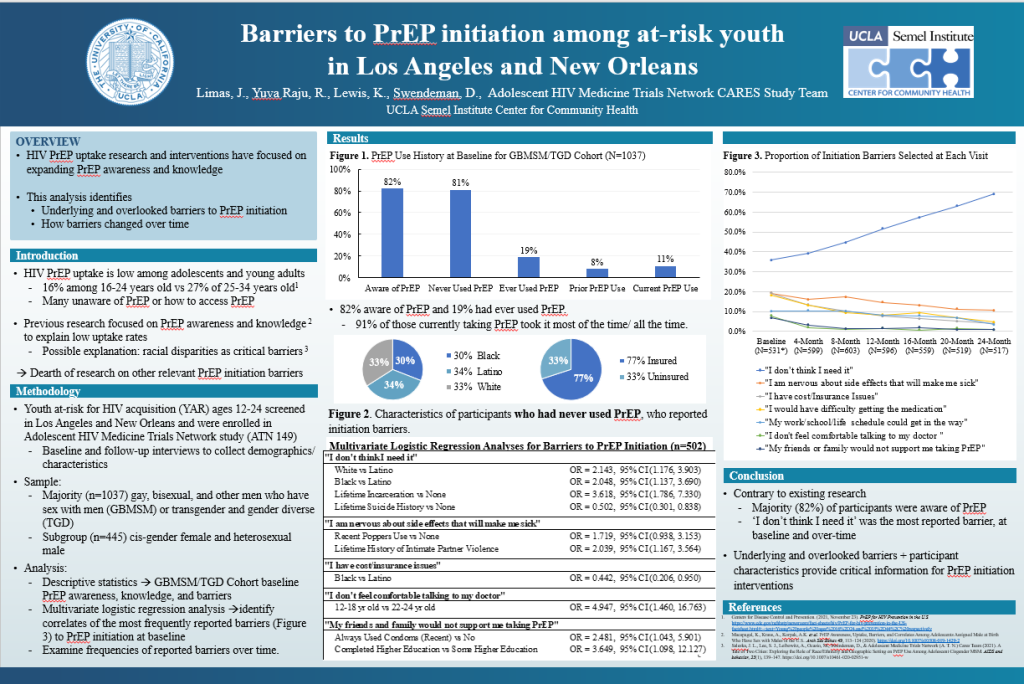
POSTER PRESENTATION 9
Presenter(s):
- Reshmi Mukerji, MPH, Graduate Student, University College London, Institute for Global Health
Presentation Title: Qualitative study of intersectional stigma of HIV and other marginalized identities among women living with HIV in India
Summary: Women living with HIV carry a disproportionate burden of HIV stigma, especially in countries where gender discrimination is rampant. Women who have additional marginalized identities often experience worsened violence as a result of multiple stigmas. The nature of this violence can be temporal in nature, as there is a reduction in enacted and internalized stigma over time.
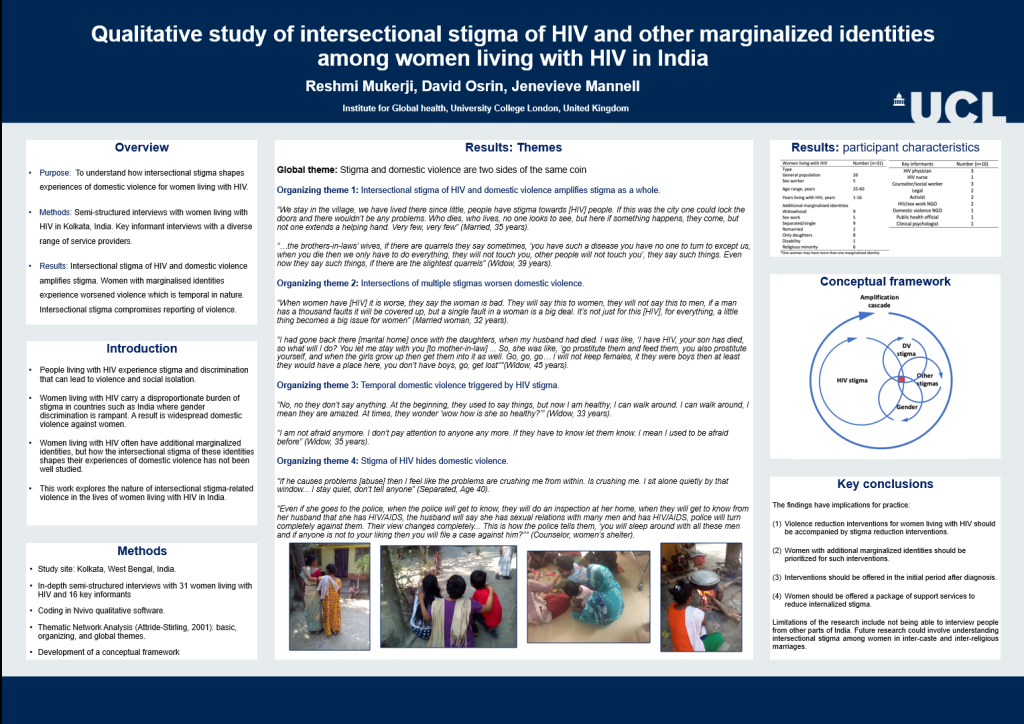
POSTER PRESENTATION 10
Presenter(s):
- Ali Mhungu, PhD Student, School of Health Sciences University of Dundee
Presentation Title: Adult Girls and Young Women’s experiences of HIV in the context of patriarchal culture in Murewa, Zimbabwe
Summary: This presentation presents the personal, relational and social experiences of living with HIV amongst the adolescent girls and young women (AGYW). The results of this study indicated that despite being disfranchised by HIV, AGYW demonstrated agency and resilience.
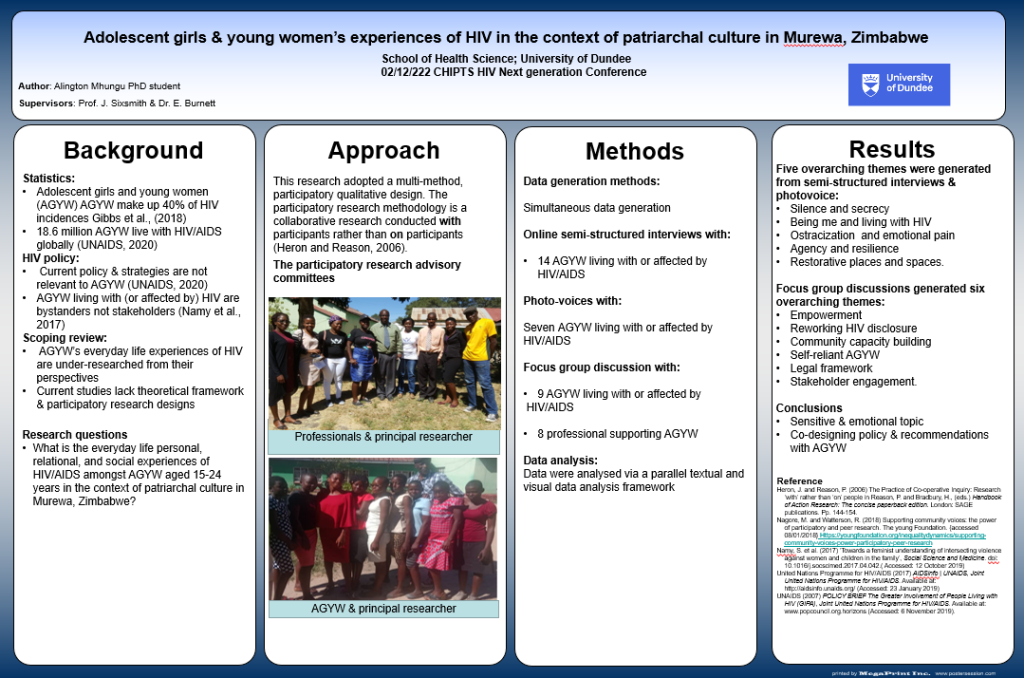
POSTER PRESENTATION 11
Presenter(s):
- Antwan De’Sean Matthews, BSc, Director Of Youth Programs, Code Tenderloin
Presentation Title: Code Tenderloin Empowering Black Youth Program Provides Incentives And Resources to Address Health Disparities in San Francisco, CA.
Summary: Throughout this workshop, the audience will learn how Nonprofits can effectively provide resources and solutions for the communities they serve through program implementation. Through the EBY program process, students are incentivized to participate in the development of the program by providing financial opportunities throughout the 16 weeks. With a diverse funding source, EBY 2022 cohort funded ten interns at $8,000 per student and three fellows at $10,500 per student. Audience members will have learned by the end of the presentation how to develop effective programs through advocacy and program development and implementation to help address health disparities in their communities.
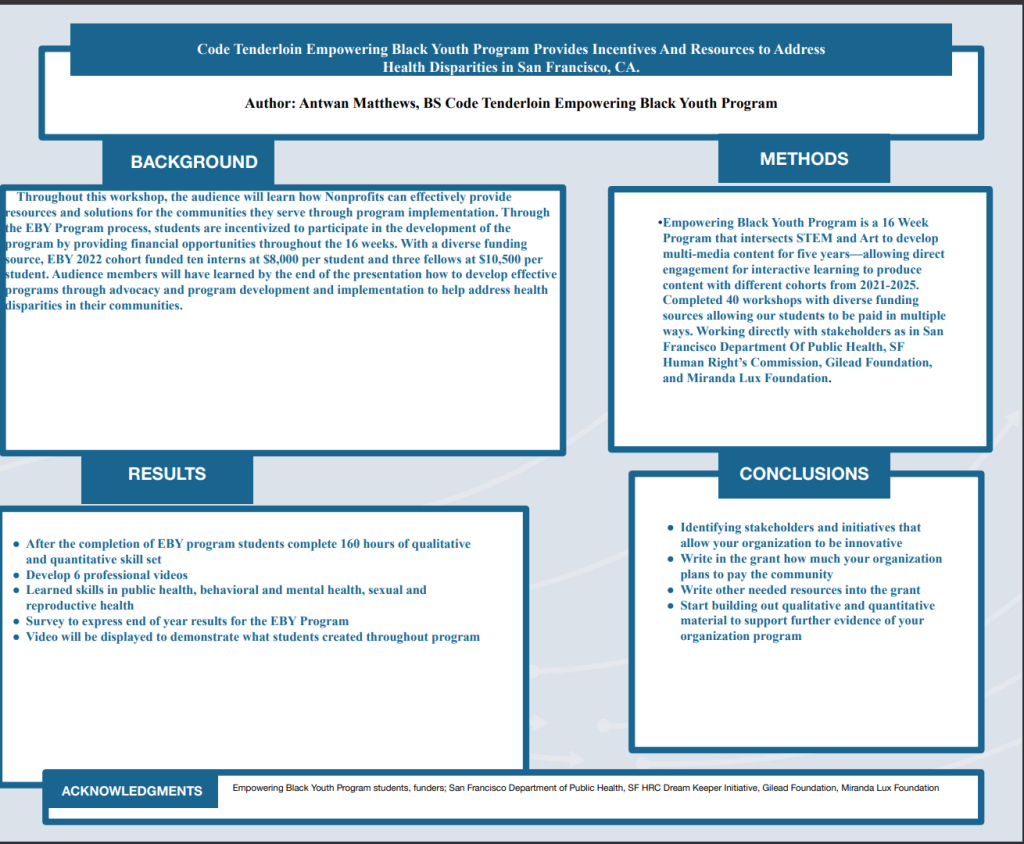
POSTER PRESENTATION 12
Presenter(s):
- Vanessa R. Warri, MSW, PhD Student, UCLA Department of Social Welfare, Luskin School of Public Affairs, Center for the Study of Women
Presentation Title: Towards Justice-Centered Futures in Transgender Research: Community-Driven Insights for Repairing and Forging Stronger Academic and Community Relations
Summary: : Robust safeguards against exploitative or harmful research practices related to transgender, gender-expansive, and intersex (TGI) communities have not yet fully been articulated, much less systematically implemented in institutional settings. This presentation offers reflective insights from phase one qualitative interviews of an ongoing collaboration between research universities and TGI communities in California to examine research priorities, ethical considerations, and opportunities to foster greater relationships among TGI and academic research communities
